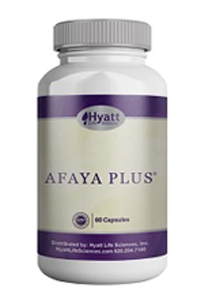Plant-Derived Supplement Shows Promise as a Natural Cancer-Fighter
Posted by Lucas Tims, ND, FABNO on Jun 17th 2020
Arum palaestinum, a perennial plant that produces a deep purple lily flower, has a long history of use as a medicinal plant in the Middle East, including cancer treatment. One survey of Palestinian healthcare providers suggested that Arum palaestinum was the most commonly used herbal medicine by oncology patients 1.
Also referred to as black calla lily, the aesthetically beautiful plant contains an impressive list of active compounds which provide several anticancer mechanisms. A U.S. based company Hyatt Life Sciences discovered that by fortifying the Arum extract with other additives such as isovanillin, harmala, and turmeric, it’s cancer-fighting effects are enhanced.2 Hyatt’s unique blend, dubbed Afaya Plus, is available as a dietary supplement. However, they are also seeking FDA approval as a novel drug against certain cancer types.
Building on its historical use in Traditional Middle Eastern Medicine, Hyatt has spent the last few years doing the clinical research needed to confirm the safety and benefits of these compounds. Early results show that the Afaya Plus blend of herbal extracts has exhibited strong anticancer effects both in vivo and in vitro. A 2015 study showed efficacy against prostate tumors in mice. A 2018 c linical trial at the University of Kansas Medical Center demonstrated that the combination of the herbal blend with Cisplatin improved the efficacy of chemotherapy in head and neck cancer.3,4
linical trial at the University of Kansas Medical Center demonstrated that the combination of the herbal blend with Cisplatin improved the efficacy of chemotherapy in head and neck cancer.3,4
In addition to its anticancer effects, Afaya Plus has also been reported to exhibit positive effects on blood sugar control, which is usually the root cause of metabolic syndrome, diabetes, and even immune dysfunction.
As for safety, there are no significant concerns given its historical use in the Middle East and the early clinical evidence. Afaya Plus should be taken with a fat-containing meal and is typically dosed at two capsules, 1-3 times a day. In addition, a cautious approach would still be advised as far as spacing it out from some types of chemotherapy agents where interactions cannot be ruled out.
While we await further clinical studies to be done, I believe the Afaya Plus should be considered a safe and beneficial supplement for cancer patients looking to improve their chance of having a good outcome with their disease.
References
- Ben-Arye E, Samuels N, Goldstein LH, et al. Potential risks associated with traditional herbal medicine use in cancer care: A study of Middle Eastern oncology health care professionals. Cancer. 2016;122(4):598-610.
- Bramwell B. Arum palaestinum as a food-medicine: a diverse history and a bright future. Natural Medicine Journal. 2019;11(2). Available at: https://www.naturalmedicinejournal.com/journal/2019-02/arum-palaestinum-food-medicine. Accessed August 14, 2018.
- Cole C, Burgoyne T, Lee A, et al. Arum Palaestinum with isovanillin, linolenic acid and β-sitosterol inhibits prostate cancer spheroids and reduces the growth rate of prostate tumors in mice. BMC Complement Altern Med. 2015;15:264.
- Vishwakarma V, New J, Kumar D, et al. Potent Antitumor Effects of a Combination of Three Nutraceutical Compounds. Sci Rep. 2018;8(1):12163.

